RSL Victoria challenged on veteran support with the sale of Vasey RSL Care
Veterans are sleeping on the streets, stuck in jail, and taking their own lives as a split divides RSL Victoria’s older and younger members, who say they just want to save their mates — “our golden rule is no one dies”.
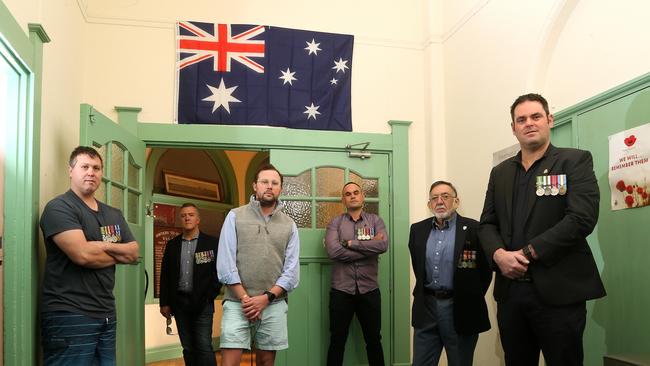
Inner East
Don't miss out on the headlines from Inner East. Followed categories will be added to My News.
An internal split has developed at RSL Victoria between older and younger veterans, with some members believing the body has lost its way and core purpose — looking after battle-scarred veterans.
Pokies, lack of support and acute care for veterans — particularly those dealing with post traumatic stress disorder (PTSD) — are major concerns for a group of veterans, who are questioning what tangible aid the RSL provides to returned servicepeople.
Hawthorn RSL sub-branch president Lucas Moon — who served in East Timor — is part of a reformer group in the RSL that is pushing for change within the century-old institution.
However, they claim to have come up against members who believe these vocal veterans are trying to divide the organisation and are not taking the correct steps to make change.
MORE ON VETERANS
VET JESSE BIRD, WHO TOOK OWN LIFE, SPENT YEARS ASKING FOR HELP
BORONIA DIGGER ON DEATH OF FRIEND AND VETERAN JESSE BIRD
ARMY VET FACES PTSD AFTER THE DEATH OF MATE JESSE BIRD
At last year’s annual conference, Mr Moon was accused of using social media to generate lines of separation between the good work being done in the RSL, and that which he wanted done without proper consultation.
But Mr Moon refuted the accusation and said his intention was not to divide but to save lives, and after receiving a suicidal goodbye message from a veteran last year, he was inspired to push boundaries.
“Yes, we have upset some people … but if I have saved one person, I think it’s probably worth it,” he told the meeting.
Mr Moon told Leader those leading the RSL had put pokies before veterans, who are sleeping on the streets, stuck in jail, and killing themselves.
“They’ve forgotten their core mission to advocate for veterans,” he said.
“They’ve been infected by Tabcorp.
“Pokies might have been the right thing to do 30 years ago but they don’t make money anymore.”
RSL SUB-BRANCHES
Mr Moon believes RSL sub-branches should be safe spaces for veterans to come and get support from other veterans, but are open to the public and full of pokie machines that are not making money.
He said because of the debt racked up by the gambling machines he believes 18 sub-branch buildings — including Mitcham and Williamstown — had been sold in the past decade because of mismanagement and debt.
“They liquidate assets to pay for the losses,” Mr Moon said.
He said there had been a scourge of suicides over the years and many might not have happened if they had a safe RSL space, without pokies and the public, to visit.
“There is nowhere you can go. The RSL was supposed to be a safe space,” Mr Moon said.
“The RSL has dropped the ball and our veterans are killing themselves.”
He said the Hawthorn RSL sub-branch was completely volunteer-run, not open to the public and had the largest membership of post-Vietnam conflict veterans, and also had a growing number of Vietnam veterans.
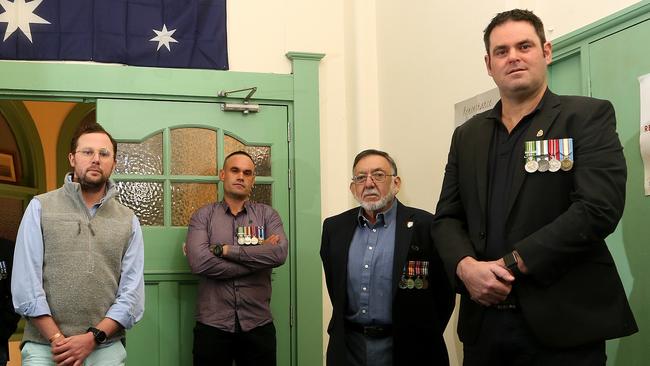
“We haven’t had one suicide, OD or car crash,” Mr Moon said.
“If you can get a bloke to join an RSL they don’t kill themselves.”
Former artillery officer Dan Cairnes, who served in Iraq in 2005, started Veterans In Construction with Dave Farell — who served in the Special Air Service Regiment — to help veterans get jobs in the civil construction industry.
Since his time overseas, seven veterans Mr Cairnes served with have committed suicide; one of them was a close friend and former housemate.
“Getting vets into work solves 80 per cent of their problems,” Mr Cairnes said.
“They can protect their families, establish homes and it gives them purpose to get up in the mornings.”
Mr Cairnes said he agreed that RSL Victoria had forgotten its true purpose was to support veterans.
He said he was not against gaming but against “bad business”.
“By now they should have an employment program, and crisis and emergency accommodation, packaged up with an ethical funding scheme,” Mr Cairnes said.
“If gaming was making money and getting the financial results you could justify it, but it’s just a self-licking ice cream,” Mr Cairnes said.
He said the RSL sub-branches were competing against the hospitality sector, that employed boards and committees with skill sets in that area.
“In the Ferntree Gully region you have three gaming sub-branches all within a 3.5km radius,” Mr Cairnes said.
“But you also have a big gaming hotel and that is where all the cars are parked.”
VASEY RSL CARE
Recently it was revealed RSL Victoria’s aged-care arm Vasey RSL Care would be sold because of a “decline” in the number of veterans and dependants using the service.
But the sale of its buildings comes despite pleas to allow the growing number of younger homeless veterans to use the service until they can get back on their feet.
Minutes from RSL Victoria’s annual conference in July last year show a divide, with the Chair telling veterans Vasey RSL Care was primarily for aged care, which was “their only skill set” and did not have the expertise to handle a troubled veteran.
But Mr Moon did not accept that.
“These are 22-year-old blokes, they are not aged care, they are veterans,” Mr Moon told the conference.
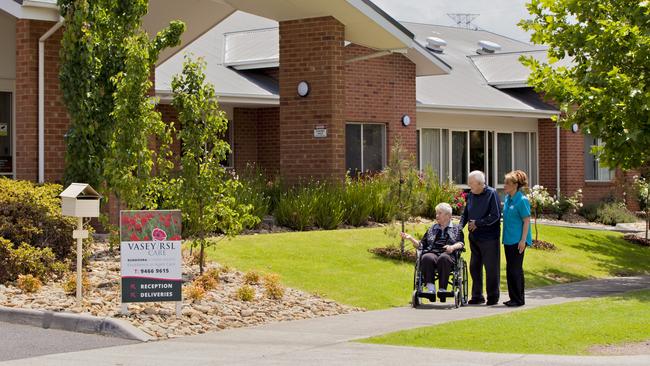
“We have heard this morning that they have done 1000 days overseas, lots have done multiple tours overseas, they are a bit sick, and us as an organisation, we seem to be passing the buck and making excuses.
“They are sleeping on the streets, they are in jail, in massive numbers and they are killing themselves.”
But according to a letter seen by Leader and dated April 2020, the RSL and the War Widows Guild signed an agreement in 2012 that “expected” Vasey Care to be sold by 2019, saying 70 per cent of clients were veterans while 30 per cent were not.
The documents revealed both groups believed it put the organisation’s patriotic status in jeopardy, and were of the view a sale would lead to more veteran welfare “including accommodation options for younger veterans”.
But Mr Moon said the sale was a cash grab.
“They don’t care about the veteran,” he said.
“They hide behind the veteran brand and no one picks on the old boys.”
SPECIALISED MENTAL HEALTH CARE
Last month, the Hawthorn RSL sub-branch was instrumental in providing the legal and financial support for Cassidy Burger, a former army combat engineer in Afghanistan, who was given a 12-month corrections order after he pleaded guilty to weapons and drug offences.
“I’ll be very clear here, Cassidy has let down his peers and his community, but the system let him down,” Mr Moon said.
“He’s our member and he’s a good friend who is in a bit of strife — our golden rule is no one dies.”
Mr Moon picked Cassidy up from the correction centre last week and took him to a rural property to attend a rehabilitation program run by a fellow veteran.
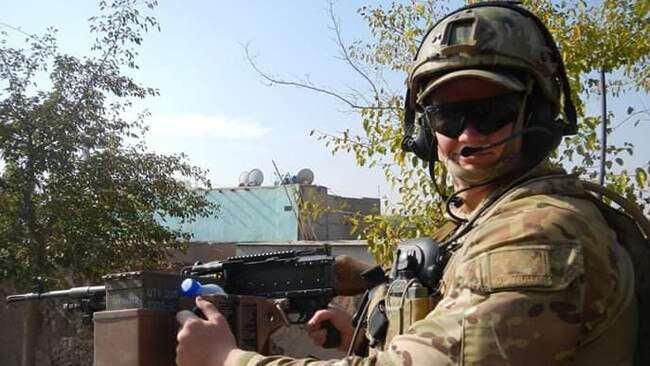
Cassidy suffers from PTSD after his two tours in Afghanistan, which traumatised him so much his discharge from the army was fast-tracked.
He has flashbacks and suffers panic attacks walking down the street.
“Cassidy is lucky, because he’s not dead. The others kill themselves,” he said.
“Cassidy died twice. He overdosed six times and died twice.
“If he had succeeded they would have just put it down as an overdose and not a suicide.”
Mr Moon said this case highlighted the lack of support for suffering veterans including the fact there was no dedicated mental health ward for former ADF members.
In 2005 the board of Heidelberg Repatriation Hospital decided to open its mental health Ward 17 — which had previously been just dedicated to ADF veterans — to emergency service personnel and TAC cases.
The ward also doesn’t take acute mental health cases, and those seeking help are directed to go through the public hospital.
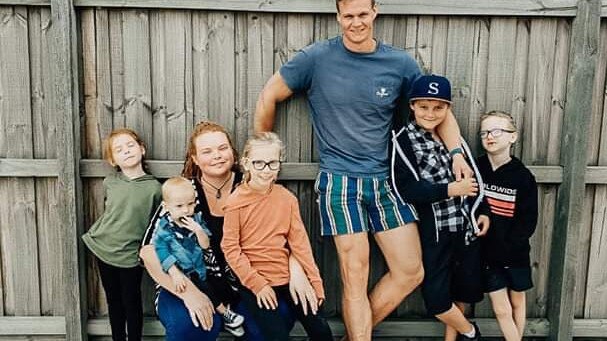
This is a sticking point for Mr Moon, who says there needs to be services just for veterans.
“They’ve had Ward 17 for more than 30 years and now they’ve told us to go to a public hospital,” he said.
“Someone like Cassidy can’t get into specialised care. It took us three months to get him into hospital.”
“They’ve closed Ward 17, they’ve closed the RSLs and now they’re closing Vasey.”
An Australian Institute of Health and Welfare report released in November 2019 revealed there had been 419 suicides recorded from 2001 to 2017 in serving, reserve and ex-serving ADF personnel.
And according to an Australian Housing and Urban Research Institute study also published in November last year, 5.3 per cent of Australian veterans who left the ADF between 2001 and 2018 experienced homelessness.
MORE: SOUPED-UP 4WDS DRIVE URGENT POLICE WARNING
LILYDALE RSL SUB-BRANCH PRESIDENT DON PARSONS DIES AT 72
BORONIA AUSSIE VETERANS OP SHOP’S MICK QUINN WANTS RENT REVIEW
The report found homeless veterans were more likely to be younger, unemployed, experiencing financial strain, have higher levels of psychological distress and PTSD symptoms.
It also found these veterans reported engaging in risky behaviours including driving and gambling, smoking and using recreational drugs, arrest or conviction for a crime, and have a greater number of traumatic life events happen.
RSL Victoria has been contacted for comment.
